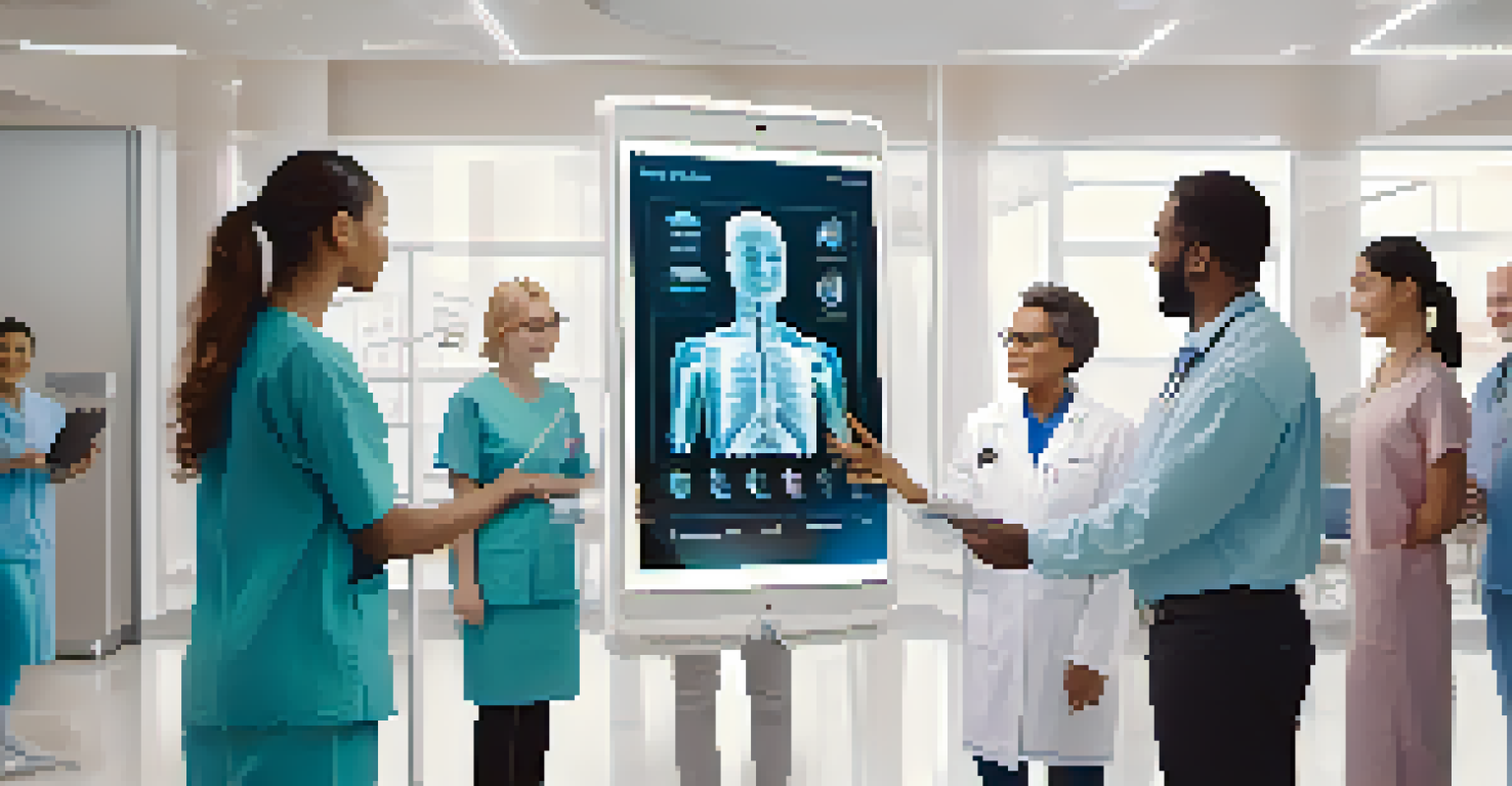The Impact of AI on Patient-Centric Care Models

Understanding Patient-Centric Care: A Quick Overview
Patient-centric care is a healthcare approach that emphasizes the needs and preferences of patients. It shifts the focus from a purely clinical perspective to one that includes the patient's experience and values. This model encourages active participation from patients in their own healthcare decisions, fostering a stronger patient-provider relationship.
The greatest medicine of all is to teach people how not to need it.
In this model, communication is key; healthcare providers strive to understand patients' concerns and provide tailored care. By prioritizing the individual’s needs, patient-centric care aims to improve overall health outcomes and enhance satisfaction. Moreover, it recognizes that each patient is unique, which adds complexity to care delivery.
As healthcare continues to evolve, integrating technology has become essential. Artificial Intelligence (AI) plays a significant role in transforming patient-centric care, offering tools that can enhance the provider-patient dynamic. Understanding how AI fits into this model is crucial for modern healthcare systems.
How AI Enhances Patient Engagement and Communication
AI technologies, such as chatbots and virtual health assistants, are revolutionizing patient engagement. These tools offer immediate responses to patient inquiries, making it easier for individuals to access information. With 24/7 availability, patients can receive support at their convenience, enhancing their overall experience.

Moreover, AI can analyze patient data to provide personalized communication strategies. By understanding a patient’s history, preferences, and behaviors, healthcare providers can tailor their messages, ensuring that patients feel valued and understood. This personalized approach helps patients become more engaged in their care plans.
Patient-centric care enhances outcomes
This approach prioritizes patients' needs and preferences, fostering better health outcomes and satisfaction.
In addition to improving communication, AI can assist in scheduling appointments and sending reminders. By streamlining administrative tasks, providers can focus more on patient interactions, ultimately fostering a more patient-centric environment.
AI's Role in Personalized Treatment Plans
One of the most significant benefits of AI in healthcare is its ability to create personalized treatment plans. By analyzing vast amounts of patient data, AI can identify trends and recommend tailored interventions for individual patients. This level of personalization ensures that treatments are more effective and aligned with each person's unique needs.
AI is not a replacement for human interaction, but a tool to enhance it.
For example, AI can analyze genetic information alongside lifestyle factors to suggest specific medication or therapy options. This not only enhances the efficacy of treatments but also reduces the likelihood of adverse reactions. Patients are more likely to adhere to personalized plans that address their specific circumstances.
Furthermore, AI can continuously learn and adapt treatment recommendations based on ongoing patient feedback and outcomes. This dynamic approach allows for adjustments in real-time, ensuring that care remains relevant and effective throughout the treatment journey.
Leveraging AI for Predictive Analytics in Healthcare
Predictive analytics is another area where AI shines, particularly in forecasting patient health outcomes. By analyzing historical data and recognizing patterns, AI can predict potential health issues before they arise. This proactive approach empowers healthcare providers to intervene early, significantly improving patient care.
For instance, AI algorithms can identify patients at high risk for conditions such as diabetes or heart disease, allowing for targeted prevention strategies. By using predictive analytics, healthcare systems can allocate resources more effectively and prioritize care for those who need it most.
AI personalizes treatment plans
AI analyzes patient data to create tailored treatment plans, improving effectiveness and adherence.
As a result, patients experience more timely interventions and improved health outcomes. This shift from reactive to proactive care exemplifies the power of AI in enhancing patient-centric care models.
AI in Remote Monitoring and Telehealth Solutions
The rise of remote monitoring and telehealth solutions has been accelerated by AI technology. Wearable devices equipped with AI can track vital signs and provide real-time data to healthcare providers. This continuous monitoring allows for immediate interventions when necessary, enhancing patient safety and satisfaction.
Telehealth platforms also leverage AI to streamline consultations, making healthcare more accessible. Patients can connect with their providers from the comfort of their homes, reducing travel time and associated stress. This is particularly beneficial for individuals with chronic conditions who require regular check-ups.
By incorporating AI into remote monitoring, healthcare systems can ensure that patients receive timely updates and personalized care. This approach not only improves adherence to treatment plans but also fosters a sense of connection between patients and providers.
Ethical Considerations: Balancing AI and Patient Privacy
While the benefits of AI in patient-centric care are clear, ethical considerations must not be overlooked. Patient privacy is paramount, and the use of AI involves handling sensitive health information. Ensuring that data is protected requires robust security measures and adherence to regulations.
Healthcare providers must also be transparent about how AI is used in patient care. Patients should be informed about what data is collected and how it influences their treatment. Building trust is essential for the successful integration of AI into healthcare models.
Ethics in AI must be prioritized
Balancing AI advancements with patient privacy and equitable care is essential for the future of healthcare.
Moreover, the potential for bias in AI algorithms raises concerns about equitable care. It’s crucial that AI systems are developed and tested with diverse populations to prevent disparities in treatment. Striking a balance between leveraging AI and safeguarding patient rights is vital for the future of healthcare.
The Future of AI in Patient-Centric Care Models
As we look ahead, the integration of AI into patient-centric care models is poised to expand. Innovations in AI technology will continue to reshape how healthcare is delivered, making it more personalized and efficient. The future promises even greater advancements in predictive analytics, remote care, and patient engagement tools.
Healthcare systems that embrace these technologies will likely see improved patient outcomes and satisfaction. As AI continues to evolve, it will play an increasingly vital role in addressing the complex needs of patients in a rapidly changing environment.

Ultimately, the goal of AI in patient-centric care is not just to enhance technology but to enrich the lives of patients. As we merge human compassion with AI capabilities, we can create a healthcare landscape that truly prioritizes the individual.